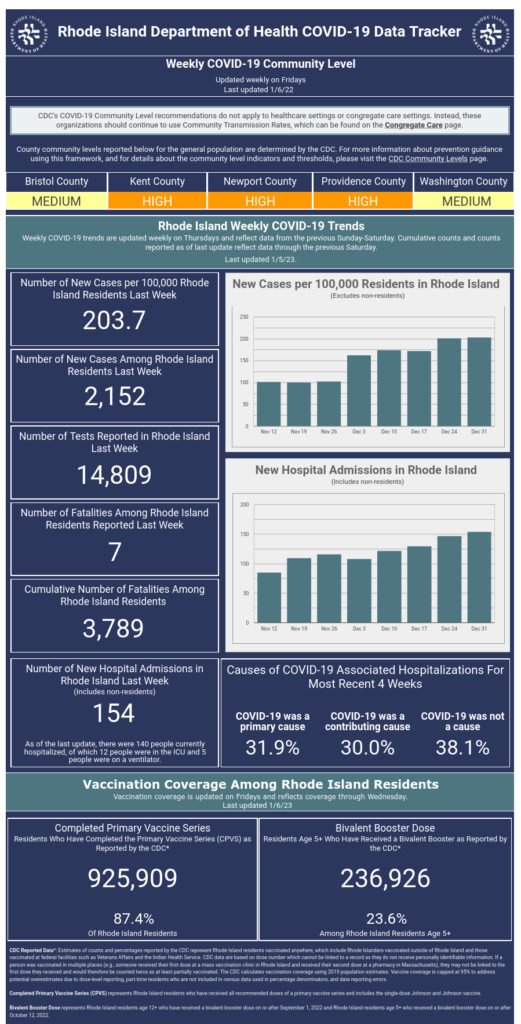
The COVID-19 pandemic in RI is not over, is not going away anytime soon, and is surging for the worse.
For the week ended Dec 31, 2022, RI reported 154 new hospitalizations, of which COVID-19 was the primary cause in 31.9%, a secondary cause in 30.0%, and not involved in 38.1%: in other words, three years into the pandemic, despite vaccines and anti-viral treatments, nearly two-thirds of hospital admissions are still caused by the coronavirus. That week, seven patients in RI died from COVID-19. The 7-day moving average of hospitalizations in RI is the most reliable indicator of severity, now that most testing uses rapid antigen tests (RAT), usually done in private. That average increased to 154 on Dec 31, from 148 on Dec 24, 136 on Dec 17, 112 on Dec 10, and 109 on Dec 3.
RI recorded 675 deaths from COVID-19 in 2022. Cumulative deaths increased from 3,114 as of Dec 31, 2021, to 3,789 as of Dec 31, 2022, an average of about 13 COVID-19 deaths per week. RI remains a national leader in vaccination – 87.58% of the population completed at least the primary vaccine series.According to the Centers for Disease Control and Prevention (CDC), a more transmissible subvariant of Omicron, XBB.1.5, has become prevalent in New England as of the week ending Jan 7, 2023, accounting for an estimated 71.6% of cases (although nationally it’s responsible for only 27.6% of cases). XBB is a recombination of two earlier Omicron sublineages, BA.2.10.1 and BA.2.75.


A study published Dec 13, 2022, in the journal Cell reported that the emerging Omicron subvariants in the BQ and XBB series are able to resist all approved monoclonal antibody (MAB) treatments and are more resistant to approved vaccines. (The study said nothing about non-MAB anti-viral treatments such as Paxlovid.)
The researchers note, “It is alarming that these newly emerged subvariants could further compromise the efficacy of current COVID-19 vaccines and result in a surge of breakthrough infections as well as re-infections. However, it is important to emphasize that although infections may now be more likely, COVID-19 vaccines have been shown to remain effective at preventing hospitalization and severe disease even against Omicron as well as possibly reducing the risk of post-acute sequelae of COVID-19 (PASC or long COVID).”
As recently as last week, the World Health Organization (WHO) reaffirmed the finding of its Technical Advisory Group on Virus Evolution (TAG-VE) that there is no evidence XBB subvariants are more virulent or produce illness more severe than the earlier Delta and Omicron variants, despite increased transmissibility. The main added risk from XBB.1.5 is that it has a greater chance of re-infecting people who recovered from COVID-19 in the pre-Omicron period.
Community transmission levels are “high” in Providence, Kent, and Newport counties, and “medium” in Washington and Bristol counties. Where transmission levels are high, the CDC recommends, “Wear a high-quality mask or respirator. If you are at high risk of getting very sick, consider avoiding non-essential indoor activities in public where you could be exposed. If you have household or social contact with someone at high risk for getting very sick, consider self-testing to detect infection before contact … Stay up to date with COVID-19 vaccines, including recommended booster doses. Maintain ventilation improvements. Avoid contact with people who have suspected or confirmed COVID-19. Follow recommendations for isolation if you have suspected or confirmed COVID-19.”
Some schools in RI have gone back to universal mask-wearing, but this is unlikely to be widely adopted due to political controversy. The RI Department of Health (RIDOH) states, “Whether or not you’re vaccinated, you’re still required to wear a mask: If a healthcare setting, business, private school, camp, or other entity requires it [or] In public K-12 schools or institutes of higher education as required by the town, city, or school administration. RIDOH recommends wearing a mask indoors near anyone you don’t live with if Rhode Island becomes a high-risk area.”
The respected Johns Hopkins University data tracker reported that the US exceeded 100 million COVID-19 cases on Dec 21, 2022, and their live tracker as of Jan 8, 2023, reports 664,175,097 confirmed cases and 6,706,716 deaths globally, of which 101,241,740 cumulative confirmed cases and 1,096,503 cumulative deaths were in the US.
Worldwide, COVID-19 remains grave and is worsening. The WHO states in its most recent weekly situation report, “Globally, more than 3 million new cases and 10 000 deaths have been reported in the week [ending] 1 January 2023… In the last 28 days (5 December 2022 to 1 January 2023), over 14.5 million cases and over 46 000 new fatalities were reported globally – an increase of 25% and 21%, respectively, compared to the previous 28 days.”


